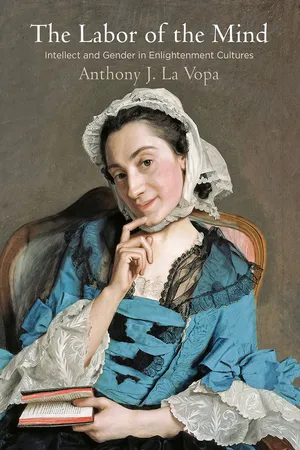
- 360 pages
- English
- PDF
- Available on iOS & Android
About this book
How did educated and cultivated men in early modern France and Britain perceive and value their own and women's cognitive capacities, and how did women in their circles challenge those perceptions, if only by revaluing the kinds of intelligence attributed to them? What was thought to distinguish the "manly mind" from the feminine mind? How did awareness of these questions inform various kinds of published and unpublished texts, including the philosophical treatise, the dialogue, the polite essay, and the essay in literary criticism? The Labor of the Mind plumbs the social and cultural logic of the Enlightenment's trope of the manly mind; offers new readings of the textual representations of it; and examines the ways in which the trope was subverted or at least subtly questioned. With close readings of the writings of well-known and less familiar men and women, including Poullain de la Barre, The Third Earl of Shaftesbury, Madeleine de Scudéry, David Hume, Antoine-Léonard Thomas, Suzanne Curchod Necker, Denis Diderot, and Louise d'Epinay, and tracing their social networks and friendships, Anthony J. La Vopa explores the problematic opposition between mental labor as concentrated and sustained work, a labor of abstraction and judgment for which only men had the strength, and an aesthetic of effortless and tasteful play in polite conversation in which women were thought to excel. Covering nearly a century and a half of cultural and intellectual life from France to England and Scotland and then back again, La Vopa locates, beneath the tenacity of assumed natural differences, a lexicon imbued with ambivalence, ambiguity, and argument. The Labor of the Mind reveals the legacy for modernity of a fraught gendering of intellectual labor.
Frequently asked questions
- Essential is ideal for learners and professionals who enjoy exploring a wide range of subjects. Access the Essential Library with 800,000+ trusted titles and best-sellers across business, personal growth, and the humanities. Includes unlimited reading time and Standard Read Aloud voice.
- Complete: Perfect for advanced learners and researchers needing full, unrestricted access. Unlock 1.4M+ books across hundreds of subjects, including academic and specialized titles. The Complete Plan also includes advanced features like Premium Read Aloud and Research Assistant.
Please note we cannot support devices running on iOS 13 and Android 7 or earlier. Learn more about using the app.
Information
Table of contents
- Cover
- Contents
- A Note on Translations
- Introduction
- Chapter 1. The Social Aesthetic of Play in Seventeenth-Century France
- Chapter 2. Poullain de la Barre: Feminism, Radical and Polite
- Chapter 3. Malebranche and the Bel Esprit
- Chapter 4. Love, Gallantry, and Friendship
- Chapter 5. Shaftesbury's Quest for Fraternity
- Chapter 6. The Labors of David Hume
- Chapter 7. Genius and the Social: Antoine-Léonard Thomas and Suzanne Curchod Necker
- Chapter 8. Minds Not Meeting: Denis Diderot and Louise d'Épinay
- Conclusion
- Notes
- Index
- Acknowledgments